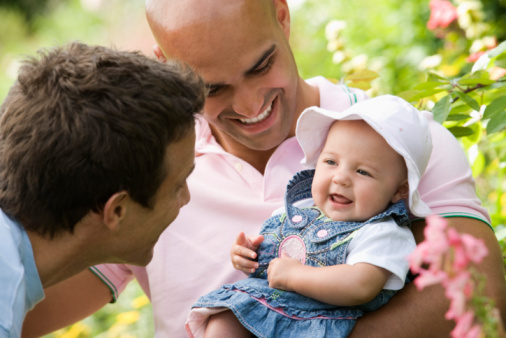
Becoming a surrogate mother could be one of the most rewarding experiences of a lifetime. When you make the decision to become a surrogate for a same-sex couple, you are helping make a dream come true – a dream that might have been almost inconceivable just a few decades ago.
CLICK HERE TO APPLY NOW
Why Become a Surrogate for a Same-Sex Couple?
If you have found this page, you probably know that a surrogate mother is a woman who agrees to get pregnant through IVF (in vitro fertilization), and carry a baby for a couple. Surrogates are in high demand for loving same-sex couples with much to offer.
Although lesbian couples might find that they need a surrogate because neither can carry a child, the majority of same-sex couples looking for someone to help with their dreams, are gay male couples.
For gay men who want a child, surrogacy offers the chance to have a child with a biological connection to one of the partners. It may also be one of few opportunities for them to have a child at all, since not all agencies or states are LGBT-adoption friendly yet.
Quelling Myths About Gay Parents
Despite the strides that have been made, and all the new information available in support of healthy gay parentage, the old myths heard in younger years might come to mind.
For instance, some still worry that gay parents won’t be able to provide well for a child emotionally. According to the American Academy of Pediatrics, children raised in homes with same-sex parents experience lives very similar to those raised by a man and a woman. Studies show that the children are equally well adjusted when they are raised by gay parents.
Studies also show that a desire to parent, and the ability to do it well, are not influenced by sexual orientation. The greatest predictor of a child’s well being is a loving, nurturing home, the relationship with the parents, and their relationship with each other. Today, more children grow up in single-parent or gay parent homes than those raised in a household with two biological parents.
People also worry that children raised by gay parents will become gay themselves. However, children do not form sexual orientation based on a parent’s orientation. If that were the case, there would be very few lesbians or gays today, because most of them were raised by heterosexuals.
Sometimes, there are worries that children need both a male and female role model in the home to fare well in life. Children do need good role models, and it is very healthy to have role models of both genders in life. Role models come in many forms, however, including aunts, uncles, cousins, grandparents, family friends, teachers and so on. Many children with single parents have grown up happy and well adjusted.
Finally, there may be concerns about how children and their gay parents “fit in.” The truth is, this scenario is well-known today and most people, including school children, are aware of these possibilities and don’t put much thought into it. Although anyone can be teased about anything — from their hairstyle to the way they talk, there is a heightened awareness of teasing and zero-tolerance in most schools now. With solid parenting children are resilient.
By becoming a surrogate for a same-sex couple, you are making dreams of parenthood come true, but also helping put an end to any remaining myths about same-sex parentage.
Talk to us. Many of us have been in similar situations. We understand and want to support you in your decision, whatever it might be. For now, let’s explain the two types of surrogacy.

Types of Surrogacy
There are two types of surrogacy: Traditional and Gestational.
Traditional Surrogates are women who are inseminated with the father’s sperm, which fertilizes the surrogate’s egg. The mother has a biological connection to the child, but agrees by contract to give the baby up at birth.
Gestational surrogates are women who go through In Vitro Fertilization, and are implanted with an existing embryo, formed in a lab by a man’s sperm and another woman’s egg. Gestational surrogates are gestating and birthing a baby not genetically related to them. Today, gestational surrogates are more common than traditional surrogates.
If you would like to help a same-sex couple’s dream come true by carrying their baby, apply to become a surrogate today, or call us at (925) 945-1880.
CLICK HERE TO APPLY NOW
References
Allen, M., & Burrell, N. (1994). Comparing the Impact of Homosexual and Heterosexual Parents on Children: Meta-Analysis of Existing Research.
Murphy, D. A. (2013). The Desire for Parenthood: Gay Men Choosing to Become Parents Through Surrogacy. Journal Of Family Issues, 34(8), 1104-1124. doi:10.1177/0192513X13484272
